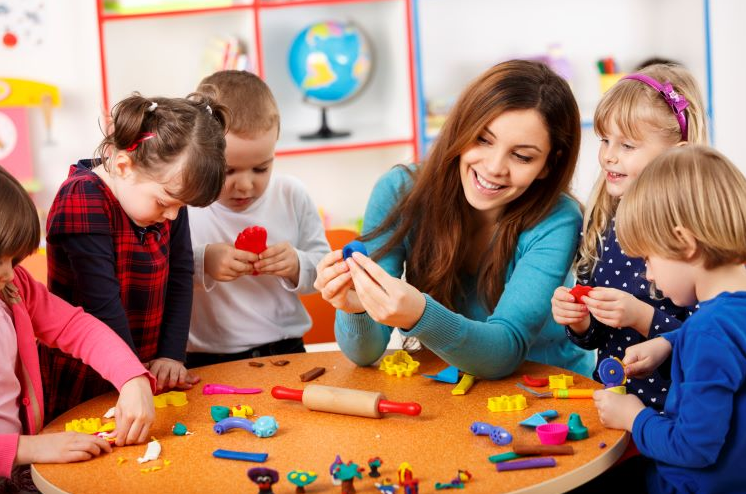Few things can be more frustrating than watching your child struggle to make friends or have difficulty fitting into certain social settings. There are several steps parents can take to improve their child’s social skills. We all know that making new friends and forming new bonds with others can be challenging. For kids, it can sometimes feel like the hardest thing in the world. However, helping to improve your child’s social skills can make the process a whole lot easier.
You can help your little one develop social skills by encouraging and working with them to understand the importance of socializing. Sometimes, we don’t know where to begin or where to look for new ways to help our children out. Read on, and take a precise look at our list of ways to improve your child’s social skills and try some of them out in your own time.
Understanding Social Interaction Skills
Higher level social skills, like negotiation, conflict resolution, assertiveness, non-verbal communication, and public speaking, will become more important as your child gets older, so it is important to practice them from a young age. Encourage your child to tell stories and speak in front of groups of relatives and friends, get them to use body language when communicating, force a negotiation with them when considering buying a treat or toy, and make them argue their point across. These are all workplace skills, so practicing them as a child will help them as they get older.
Signs that your child may need help with social interactions.
If you’ve spent lots of time making eye contact with your child and chatting with them and they haven’t reciprocated, then your child may need social skills. It’s the child’s role to model when it comes to social situations, so even giving your child plenty of opportunities to learn from you might need that extra push. This is where social skills come into play. Social skills have many benefits and opportunities to help your child communicate, play with peers, and even decrease maladaptive behaviors.
Creating a Supportive Environment
Your kiddo deserves a safe and nurturing home environment for her interaction. You might have found that people around her are more likely to be positive, caring, open, genuine, and empathetic towards you. So, modeling these behaviors should be something to aim for. Easier said than done, right? Getting back to the basics of social skills is often the best way to achieve this for both you and your child.
Encouraging open communication and active listening at home.
It is important to remember that the effectiveness of your communication is often measured by the response you get from the person you are communicating with. For example, if your child doesn’t respond to your communication in the way you hoped, then your message’s delivery needs to be clearer. This is more than just sitting silently and waiting for your child to stop talking. Check your understanding of what your child has said by summarising or repeating what they said. Ask questions if you are unsure about anything, and encourage your child to be more specific where possible.
Modeling positive social behaviors as parents and caregivers.
This is often understated and forgotten,, but you must be a good social role model. Improving your child’s social skills can be simple: acting responsibly, listening, showing them good communication skills, and being respectful. Explain your emotions to them, use eye contact, apologize for mistakes, and use empathy. These are all ways that you can be a great role model. Use everyday routines to “show and tell” children your expectations for appropriate behavior. For example, how to greet someone new or how to share a toy during play.
Encouraging Play and Group Activities
Play with your child in a way that you would like them to interact with their peers. This is a free pass to be a ‘big kid’. Get on the ground and play at their level and try to be in the moment as they often are. Be inquisitive. Ask questions. Show that you are interested in what they are doing and why they are doing it. Be sure to demonstrate manners and how to share and take turns. This is also an opportunity to demonstrate problem-solving and conflict-management skills. In these instances, take turns expressing what your needs are and allow your child to do the same.
Suggestions for structured and unstructured play activities.
Time spent playing with children can be one of the best investments you make in their educational future. One of the easiest ways to help children develop socially is by the simple act of playing. Playing with your child builds relationships in a climate of fun. Play puts you in a great position to teach skills for sharing and cooperation. You can introduce concepts like winning or losing. Play also gives children a chance to learn about more subtle social cues, like body language and vocal intonations. So don’t be afraid to turn up the music for a little song and dance, put on a puppet show, or pull out some favorite board games and have fun!
Benefits of team sports, clubs, and group activities.
Clubs and sports play a significant role in helping children build important social skills. Engaging in group activities such as team sports or clubs encourages children to work together and collaborate with others, which in turn fosters the development of vital social skills. Teamwork and cooperation are essential components of group activities, whether it’s playing a team sport or participating in a club activity. Children learn to communicate effectively, listen to others, and take turns, which are fundamental social skills that contribute to their overall development.
Teaching Empathy and Emotional Understanding
If children better understand how others feel, they are much more likely to feel connected to other people and form positive bonds. Parents suggest teaching empathy by talking about different situations and scenarios with their children. Ask how other people might feel when each of these things happens. Part of teaching empathy is helping children learn how to listen to others actively. This involves focusing on what others are saying and then thinking about what the speaker said once the conversation ends.
Role-playing and empathy-building exercises.
It’s important to be consciously aware of how you interact with others when your child is watching. Are you asking questions of others and then taking the time to listen actively? Do you show genuine empathy for friends and family in your life? Children are constantly watching the adults in their lives. It’s important to remember that it will take time for your child to develop good social skills. Social skills are something that are developed and improved upon over a lifetime.
Encouraging children to consider others’ perspectives.
Enjoying others will come more naturally when a child is doing something they are genuinely interested in. Whether it’s participating in a favorite sport, playing an instrument they like, or being part of a club they’re interested in, this is the first step toward building social skills. It also places a child around like-minded individuals that the child will probably feel more at ease with. While it’s important to be able to socialize with those of varying interests, starting with other kids who like the same things is an excellent way to build social skills.
Enhancing Communication Skills
This tip will go a long way toward improving your child’s social skills. Eye contact sounds like a very simple thing, but it is a very important skill to have. It shows that we’re listening to a conversation and that we’re fully engaged in the social situation. When talking to people, encourage your kids to maintain eye contact and practice talking to others while looking into their eyes. It will make them feel more confident and heard while improving their listening skills.
Games and activities that promote conversation and active listening.
Children love to play, so why not bring a little social skills practice to playtime? Empathy tasks, interviewing games, and asking “How does it make you feel?” are all simple yet effective ways of teaching social skills. Empathy tasks – like pretending your child is someone famous while you interview them – are a great way of putting your child in someone else’s shoes. Children learn while playing, so why not involve some dress-ups, toys, or maybe a tea party as a way to improve your child’s social skills? There is always more to learn once you get dressed up as a princess, a pirate, or a clown!
Importance of storytelling and reading together.
Besides being an exciting and fun activity you can do with your child, telling stories is also beneficial for various aspects of children’s cognitive growth and development. One of the primary benefits of storytelling is that it can help teach children important lessons about right and wrong, good and evil, and other virtues. For example, when you read bedtime stories to your child, you can incorporate the characters and plot to help you discuss the importance of basic morals (such as honesty, kindness, and generosity.) Stories can also help children develop a sense of empathy for others, and learn how to resolve conflicts effectively.
Building Confidence and Self-Esteem
Infants and young children explore their environment through movement and interaction. As a child develops confidence and controls over her body, she becomes more eager to venture into the world around her. Aid her natural curiosity by organizing activities that promote safe exploration, both at home and while out. Examples include asking children for help while preparing a meal. Or tasking them with finding an item at the grocery store. Children will rise to the occasion when you give them opportunities to take part in more complex activities.
Positive reinforcement and praise for social efforts.
Positive reinforcement and praise for social efforts play a significant role in building confidence in children. It involves acknowledging their efforts, achievements, and positive behaviors. By focusing on their strengths and highlighting their successes, parents can help children develop a positive self-image and belief in their abilities. For example, recognizing children displaying favorable social behaviors, such as taking turns or being kind, with verbal praise helps to reinforce positive behaviors.
Encouraging risk-taking in a supportive manner.
You can support your child when they try new activities or have new ideas by emphasizing that it’s okay to fail. This encouragement can help your child learn that failure can be an important step towards success. Create a safe environment where they can test their limits and learn from mistakes without fear of criticism. Positive self-esteem is critical to healthy social development. Compliment children on their behavior, and the progress they have made toward goals. When you acknowledge these successes, children learn how to act on their feelings in a healthy way.
Managing Social Challenges
When your child is shy, anxious, or inhibited in unfamiliar situations or when interacting with others, he is most likely to be nervously constrained if they feel they are ‘on show’, such as when meeting someone new or having to speak in front of others. A shy child is much more comfortable watching the action from the sidelines than joining in. Most children feel shy from time to time, but some of their lives are severely curtailed by their shyness. Children who suffer from extreme shyness may grow out of it as they mature, or they may grow up to be shy adults. Parents can help their children to overcome mild shyness. In severe cases, professional help may be advisable.
Helping children navigate conflicts and disagreements.
Conflict is a normal occurrence between children. Learning to resolve conflict is an important life skill for children to develop. Whether your children are squabbling or getting into disagreements with playground playmates, it can be hard to know how to help your child learn to deal with conflict and when and how to involve yourself in your child’s conflicts. Dangerous fights need to be stopped immediately. Separate the children. You can talk about what happened when they have calmed down and clarify that no violence is ever allowed.
Strategies for dealing with bullying and exclusion.
From mocking to bullying and to exclusion, a certain age of kids will never let their parents or teachers rest. To counterattack bullying, as a parent, you will know where your child fits into their school’s social structure. Children with high social status have a lot of friends, teachers like them, they’re popular and make friends easily. You should encourage them to stand up for children who are bullied. Let them know it is OK to say to the aggressor, “That’s not OK,” and then take the victim under their wing. If they aren’t comfortable with that, they can always tell a teacher or another trusted adult.
Having at least one best friendship can protect children against the negative effects of chronic bullying. As a parent, you can foster the best friendships. Encourage your child to invite a close friend to do things together and help them spend more time with the children important to them. If your child is a victim of bullying, or if your child is a bully, and the situation has surpassed what you as a parent have the resources to fix, professional help is available.
Involving Professionals When Needed
Signs that professional help may be necessary.
It’s normal for your kid sometimes to feel sad, anxious, or angry. However, be aware of how often or intensely they feel these emotions. A therapist can help you recognize what triggers intense emotions and identify how you normally respond to such triggers. Poor mental health can impair concentration, attention, energy, and memory. All of these drain fulfillment and drive for school. Your kid’s mental state is strongly related to their physical state. That’s why mental health issues often profoundly impact their sleep and appetite.
Types of professionals who can assist (speech therapists, psychologists).
Reaching out to help is key and can help your kid improve their interaction skills. Psychologists and speech therapists address the personal, social, and academic aspects of a child’s disability. Some professional counselors choose to focus on children’s rehabilitation only. A school counselor works with students to help them cope with issues and succeed academically. They may help students plan their class schedule, decide which college they want to attend, and explore career options. School counselors can assist children in developing new skills and resolving social conflicts.
How to seek and choose the right support for your child.
Parents want what is best for their children, but every parent makes mistakes. Did you know that focusing on what you have done well and overcoming mistakes is a vital takeaway? Asking for help is not a sign of failure or poor parenting. It’s recognizing that some rough patches are rougher than others and require some help to smooth the path. After making the initial phone call for assistance for your child, you feel relief and a sense of pride. You will be giving your child the opportunity to be his best at this stage in his life.
Encouraging Ongoing Social Growth
Setting realistic goals and expectations.
Goal setting is an important part of self-regulation. It can be the foundation for other self-regulation strategies. When they set goals, students can get an opportunity to observe their behavior. This observation can help them pinpoint areas for improvement. Learning how to set goals helps them identify what they need to do, lets them see how they are progressing, and motivates them to act productively. Parents can help children set goals for themselves. The goals need to be specific and challenging, but not too hard. A goal should be quickly attainable so students can experience a sense of accomplishment and move on to tackle the next one.
Celebrating progress and milestones in social development.
Celebrating milestones contributes to the development of a child’s self-confidence. Whether big or small, you can acknowledge the achievements to reinforce the idea that the efforts are valued and worthy of recognition. This positive reinforcement builds a foundation of self-esteem and resilience for your child. When children experience joy and pride in their accomplishments, they are more likely to approach new challenges with enthusiasm and a growth mindset. This attitude lays the groundwork for a lifelong love of learning.
Providing continuous opportunities for social interaction and learning.
Continuous opportunities for social interaction tap into intrinsic motivation—the internal drive to achieve and succeed for personal satisfaction. When children experience the joy of accomplishment, they are more likely to be motivated by a genuine love for learning rather than external rewards. It creates a shared sense of accomplishment and joy, fostering positive relationships based on support, encouragement, and mutual celebration. These connections are foundational to a child’s sense of belonging and security.
Conclusion
We often underestimate the importance of our social and communication skills, even though we rely on them heavily to get through our day. And so does your kid! While social and communication skills are used to build relationships and bond with other people, we sometimes forget that they are also important for growth in many other areas of our lives.
Like any developing skill, social skills need support, practice, and repetition. The desired behaviors are learned and taught through a variety of accumulating experiences. Children rely on adults and other caregivers to help them develop social skills. Positive and caring experiences in a child’s early years build the brain connections for learning and feeling good. Their self-esteem and confidence rise and children are more equipped to cope with life’s challenges. Whether you’re a parent or an educator, the strategies will help promote social development in young children.



